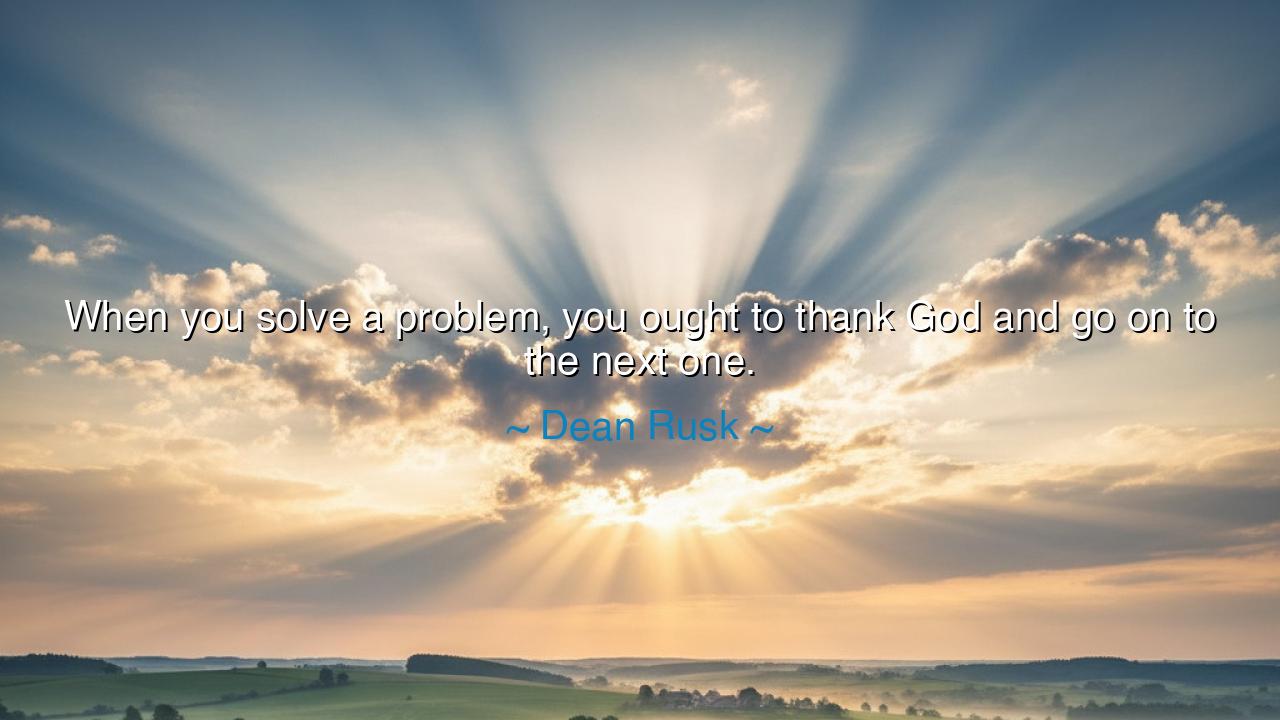
When you solve a problem, you ought to thank God and go on to






Dean Rusk, a man who bore the heavy mantle of leadership during the turbulent years of the Cold War, spoke with the sobriety of one who understood the weight of duty: “When you solve a problem, you ought to thank God and go on to the next one.” In this saying lies the rhythm of life, the ceaseless unfolding of challenges, and the wisdom of facing them with both humility and perseverance. For the path of man is never free of trials; to solve one difficulty is not the end of struggle but the beginning of another. Yet, if we receive each solution with gratitude, we are fortified to continue onward without despair.
To solve a problem is to wrestle with chaos and restore order, whether in the affairs of nations, the struggles of families, or the depths of the soul. But Rusk reminds us that victory is never ours alone. Success does not come merely from cleverness or power, but from a grace beyond ourselves. Thus, when resolution comes, the wise do not boast in their own strength, but thank God, acknowledging that every solution is born of providence, cooperation, and unseen mercies. In this humility lies strength, for the one who gives thanks is made ready to face the next one.
History itself affirms this wisdom. Consider Winston Churchill during the Second World War. Each battle fought and won—whether in the skies over Britain or in the sands of North Africa—was never final. No sooner had the people cheered a victory than another crisis arose. Yet Churchill pressed on, steady and resolute, refusing to be lulled by triumph or crushed by trial. Each problem solved was only one step along a greater road. Had he lingered in pride after each success, or sunk into exhaustion, the war might have been lost. Instead, he embodied the truth of Rusk’s words: face the challenge, give thanks for deliverance, then move forward to confront the next storm.
So it is in our daily lives. The parent who solves the quarrel of today will find another rising tomorrow. The worker who overcomes one hardship in his labor will soon meet a fresh one. The soul who conquers one temptation will find yet another waiting. This is not failure but the rhythm of human existence. We are not meant for a life without struggle, but for a life of constant growth. And growth is forged by the fire of unending problems met with courage, gratitude, and endurance.
There is also a warning in Rusk’s words: do not dwell overlong on your victories. To cling to the past is to lose sight of the present. Life demands momentum. Solve, give thanks, and press onward. For if you pause too long in celebration, you may find that the world has already moved on, and new problems now tower before you, unaddressed. Gratitude must be the pause between struggles, but perseverance must be the melody of the whole song.
The ancients, too, taught this. The Stoics counseled their disciples to greet every trial as training, to face each solved difficulty not with pride but with readiness for the next. The Hebrews sang of manna in the wilderness—bread given for a single day, no more, no less—teaching that each day’s provision is enough, but tomorrow will bring its own hunger, its own need for trust. Life is not a single battle, but a campaign.
The lesson for us, then, is plain: approach life’s problems not as curses, but as opportunities to grow, to trust, to fight bravely. When you find a solution, pause and lift a word of thanks—whether to God, to fate, or to those who labored with you. Then set your face to the road again. Do not be surprised when another problem rises; expect it, for this is the way of life. The warrior does not fear the next battle—he is strengthened by the last one.
Practically, let us take this wisdom into our days. When you conquer even the smallest difficulty, whisper thanks before rushing on. Do not imagine that gratitude is reserved for great victories; it belongs also to the small triumphs. And when the next challenge comes, as surely it will, meet it not with despair but with readiness, saying in your heart: “I have solved before, and I will solve again.” In this rhythm of struggle, thanksgiving, and perseverance, life becomes not a burden, but a noble journey.
Thus, Dean Rusk’s words stand as a guide for all generations: solve a problem, thank God, move on. This is the way of resilience, the path of courage, the road of the enduring spirit. For life is not the absence of struggle, but the triumph of gratitude and strength amidst unending trials.






AAdministratorAdministrator
Welcome, honored guests. Please leave a comment, we will respond soon